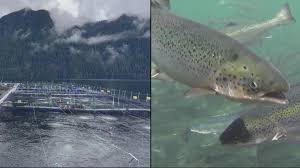The federal government is giving the British Columbia aquaculture industry another five years to transition away from open-net pen farms.
Prime Minister Justin Trudeau promised in 2019 to phase out the controversial open-water industry, and the federal government had set a target of 2025.
Fisheries Minister Diane Lebouthillier and Energy Minister Jonathan Wilkinson revealed the new timeline in twin announcements in Vancouver and Ottawa on Wednesday, saying licence extensions to 2029 to allow for a “responsible, realistic, and achievable transition.”“The industry knew changes would be made and I think all of us together we will co-build sustainable fisheries for our population for the future,” Lebouthillier said.
Wilkinson said the phase-out remains necessary given the declining stock of wild Pacific salmon and the critical role the fish play to First Nations people and to B.C.’s ecology and economy.
While there remains “significant scientific uncertainty” about the impact of fish farms on wild salmon stock, the federal government must act on the “precautionary principle” and address all potential causes of the species’ decline.“Proponents of open-net pen salmon aquaculture have argued that the impacts on wild Pacific salmon stocks are not significant,” Wilkinson said.“On the other hand, many scientists, including those from a wide range of academic institutions and from respected institutions such as the Pacific Salmon Foundation have argued strongly that the potential impacts of open-net pens on wild pacific salmon stocks are indeed significant.”
Wilkinson noted that no other jurisdiction in North America currently allows open-net pen salmon farming. Washington state, the last to do so, banned it in 2022.
The new five-year extensions will come with stricter conditions of licence, while after July 1 only marine or land-based closed containment facilities will be considered.
Ottawa will also introduce new nine-year licenses for facilities that commit to moving to closed-containment farms within five years.The government aims to release a transition plan by July 31.
That plan will address how to support workers, First Nations and communities, identify necessary economic supports for clean aquaculture technology, address criteria for the five-year phasedown and deal with the management of existing open-net facilities until the ban takes effect, Wilkinson said.
Opponents of the fish farming industry including environmental groups and a large coalition of First Nations hailed the plan to phase the industry out.But Bob Chamberlain, chair of First Nation Wild Salmon Alliance, said it was disappointing to see a five-year delay given the multitude of threats salmon are already facing.“There is a critical need of immediate safeguarding of wild salmon,” he said.
Chamberlain said the announcement was a “significant move” to address food security and reconciliation with B.C. First Nations, 90 per cent of whom rely on wild salmon.


